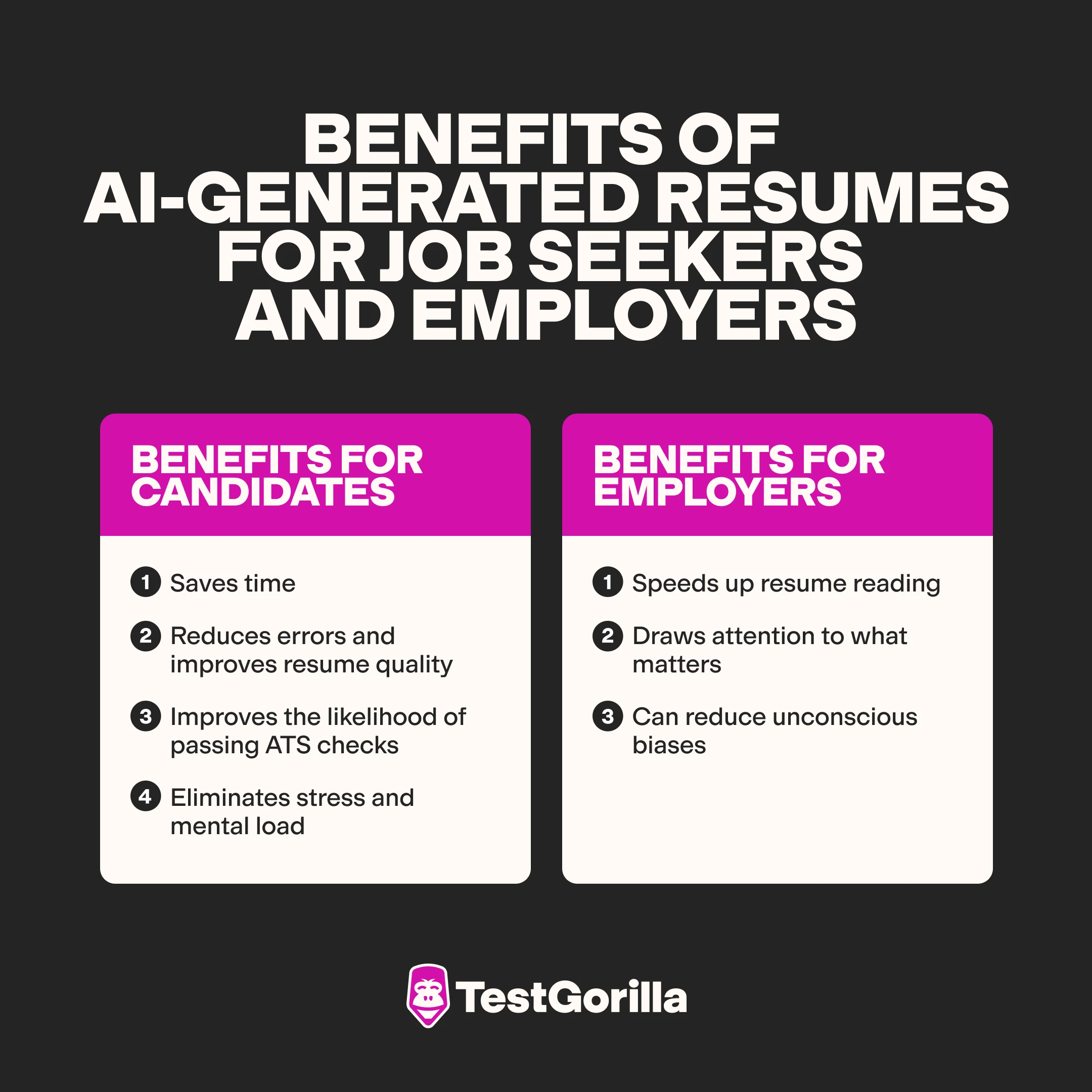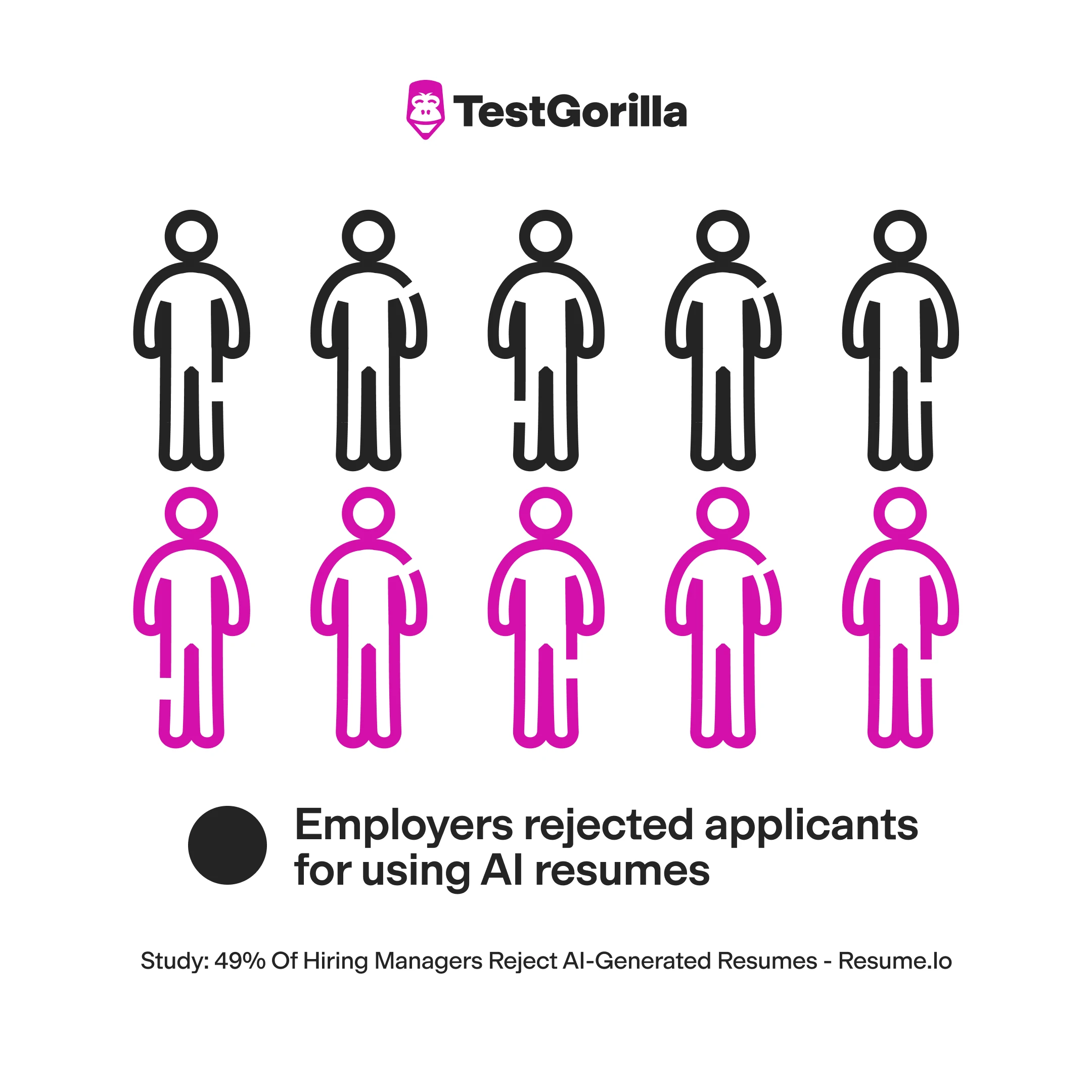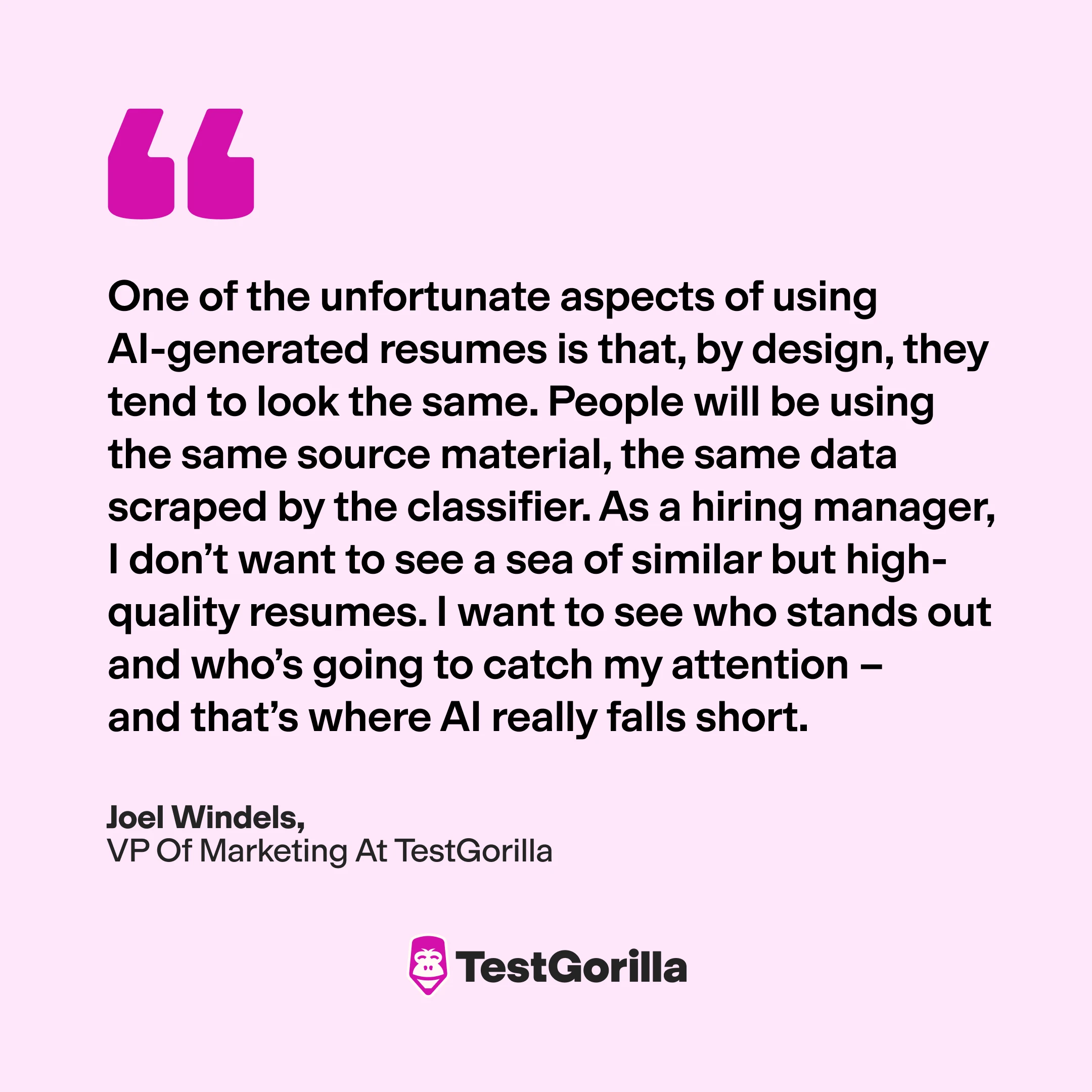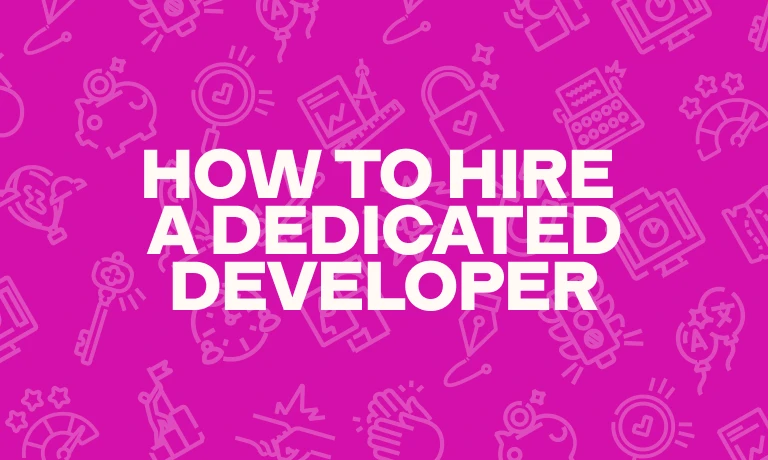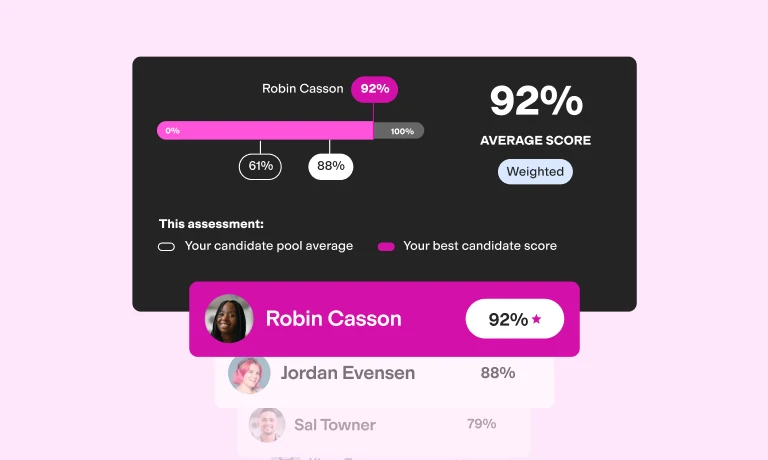Today, more and more applicants are using AI assistance to write resumes. Is this a good or bad thing, and how should employers feel about it?
There are advantages and disadvantages. For instance, while AI can save candidates tons of time, employers might be frustrated by resumes that all look the same – which makes it harder to spot the best talent.
But AI isn’t going anywhere, and neither are AI-generated resumes. So, in this guide, we explore the pros and cons of AI-generated resumes for job seekers and employers and offer top tips for leveraging AI's wonders without impacting the quality of your hires.
What are AI-generated resumes?
AI-generated resumes are resumes created or improved using artificial intelligence tools. These tools help job seekers with anything from writing and formatting to editing and proofreading resumes.
Here are some ways candidates use AI to improve or generate resumes.
Content generation tools like ChatGPT can write entire resumes from scratch by using a brief history of candidates' accomplishments and skills.
Keyword optimization tools like Jobscan analyzes job descriptions and highlights keywords that candidates can add to their resumes to improve their chances of passing through applicant tracking systems (ATSs).
Design and formatting software like Zety uses AI to format and design resumes, making them consistent, visually appealing, and easy to read.
Grammar and clarity solutions like Grammarly help rewrite sentences, correct spelling mistakes, improve word choice, and more to make resumes clear and impactful.
According to a recent survey by Canva, a graphic design platform, about 45% of 5,000 candidates used AI to build, update, and improve their resumes in 2023.
Benefits of AI-generated resumes for job seekers and employers
Using AI-generated resumes has pros for both candidates and employers.
Benefits for candidates
When used correctly, AI-generated resumes can both simplify and enhance candidates' resume writing process. Here’s how.
1. Saves time
One survey showed that even candidates with relatively straightforward backgrounds and good resume-writing skills spend ten hours writing their resumes. The same study also noted that some candidates spent over 30 hours per week writing and refining resumes for different jobs they were applying to.
AI tools can generate professional-looking resumes in minutes. Applicants input their job history and skills, and AI platforms quickly generate complete resumes or help with formatting and structuring content.
According to HR and hiring expert Yashna Wahal:
Today's employers look for resumes tailored to their specific company and role. In tough job market conditions, candidates often apply to hundreds of jobs. This is where AI tools can really save them time and effort by allowing them to build and refine job-specific resumes at scale quickly.
2. Reduces errors and improves resume quality
AI tools also help reduce spelling and grammatical errors in resumes and improve their formatting, design, and visual appeal.
A recent study by MIT Sloan PhD student Emma van Inwegen and colleagues showed that if you took two identical candidates with the same skills and experience, participants who randomly received AI assistance in improving their spelling and grammar were 8% more likely to be hired.
Further research also found that 83% of recruiters are more likely to hire candidates with well-formatted resumes, and 73% of hiring managers are more likely to interview applicants with visually appealing resumes.
3. Improves the likelihood of passing ATS checks
Many ATSs assist with screening candidates' resumes based on specific keywords relating to the skills, job titles, and credentials required for the job. Research shows that about 98% of Fortune 500 companies today use ATSs for recruitment.
Some AI tools can help candidates make their resumes ATS-friendly by suggesting keywords that match the job description – decreasing their chances of getting rejected by an ATS.
4. Eliminates stress and mental load
Recruitment platform Indeed recently surveyed 5,000 workers and found that more than a quarter of them felt job search anxiety was the biggest obstacle to landing their desired job.
Writing a resume – a part of the job search process – can be stressful, especially for those who feel insecure about their qualifications or writing abilities. AI tools can simplify the process by removing the guesswork from resume writing.
Benefits for employers
Contrary to popular belief, AI-generated resumes also have some benefits for employers. In fact, Canva found that of 5,000 hiring managers surveyed, 90% said it’s acceptable when job seekers use AI in applications.
Here are some of the pros of AI-generated resumes for employers.
1. Speeds up resume reading
AI-generated resumes are typically well-structured and consistent, making them easy to read. You can quickly find the most relevant information – including skills, education, and years of experience.
This is a game-changer for high application volumes or bulk hiring scenarios.
Additionally, Forbes mentioned that the time spent reviewing individual resumes is under 60 seconds. AI-generated resumes help ensure these seconds are more productive and sufficient enough for strong screening decisions.
2. Draws attention to what matters
Research shows that 83% of employers are more likely to hire someone who’s tailored their resume to the job they're applying for. AI tools can help customize resumes to specific job descriptions based on keywords that match the job’s requirements.
This helps ensure that the most important information is front and center when you're screening resumes. You won't need to sift through less relevant information and can focus on what actually matters for the job.
3. Can reduce unconscious biases
Unconscious biases in the resume screening process are a big challenge for employers and can result in mis-hiring, legal issues, and other risks. AI-generated resumes can help reduce unconscious biases by removing potentially identifying language.
For example, an admin assistant candidate might use gendered language associated with female stereotypes, such as "Assisted with event planning, including baking cupcakes for the office party" or "Provided nurturing support to team members.”
With the right prompts, AI tools like ChatGPT can spot identifying language and offer more objective alternatives, such as "Coordinated logistics for office events" or "Provided supportive guidance to team members."
This way, your hiring team is less likely to be influenced by personal attributes and will instead focus purely on skills and accomplishments – leading to fairer hiring practices.
The best insights on HR and recruitment, delivered to your inbox.
Biweekly updates. No spam. Unsubscribe any time.
Problems with AI-generated resumes for job seekers and employers
Despite its many benefits, AI-generated resumes have shortcomings for both job seekers and employers.
1. Poor employer perception
According to the Canva survey, 67% of hiring managers believe they can tell when they're reading an AI-generated or AI-modified resume. While the Canva study claimed most employers are okay with AI resumes, another study found that nearly 50% rejected applicants for using AI resumes.
Implications for candidates
If job seekers use AI resumes with employers who don't like them, they could be perceived as lazy, disinterested, and unethical and get disqualified before they've even had a chance to prove themselves.
And although over six in ten hiring managers think they can identify AI resumes, there's always a chance they've mis-classified a genuinely well-written and formatted resume as being AI-generated – which could lead to unfair candidate rejections.
Implications for employers
Recruiters and hiring managers might not be on the same page about AI use. Further, employers who are easily impressed by AI resumes could later be disappointed in the quality of candidates. Conversely, if you're quick to dismiss candidates for having an AI resume, you could miss out on top talent.
2. Difficulty showcasing soft skills and personality traits
AI tools pull from large datasets of resumes and job descriptions, focusing on common keywords and phrases optimized to pass ATS checks. Additionally, AI can list candidates' skills and achievements, but some AI tools don't tie these together to tell a compelling story. Unfortunately, this means AI resumes are often generic and lack a candidate's unique voice or personality.
Implication for candidates
Many recruiters and hiring managers rely on resumes to learn more about candidates’ stories and personal achievements. Without this, candidates won't stand out and could be denied opportunities to showcase their worth.
Implications for employers
With the same generic keywords, phrases, and designs, it's difficult to differentiate between candidates whose resumes look too similar.
Additionally, according to a report mentioned in Forbes, AI resumes mute candidates' individual communication skills, stripping you of the ability to judge candidates' communication styles, including clarity, tone, and presentation of ideas.
Without a strong way to assess candidates' soft skills and personalities, you can reject skilled candidates or progress poor quality candidates.
One of the unfortunate aspects of using AI-generated resumes is that, by design, they tend to look the same. People will be using the same source material, the same data scraped by the classifier. As a hiring manager, I don’t want to see a sea of similar but high-quality resumes. I want to see who stands out and who’s going to catch my attention – and that’s where AI really falls short. Joel Windels, VP of Marketing at TestGorilla
3. Inaccuracies and mistrust
A Resume Genius report points out that AI tools frequently generate false information. For example, they might misconstrue details and produce incorrect or irrelevant information in the resume.
Another blog discusses how AI can "stretch the truth," leading to white lies on resumes. AI tools can sometimes exaggerate information on a candidate's resume in an attempt to match resumes to job descriptions and relevant keywords. For instance, a tool might turn "assisted on ABC project" to "spearheaded ABC project," which is misleading.
And that's not where it ends – AI tools like ChatGPT sometimes fabricate information. We tested this by asking ChatGPT to write a resume by providing basic information about experience and education and sharing aspects of the job description. ChatGPT included false metrics and accomplishments.
Implications for candidates
If employers detect such errors – for instance, when candidates' interview responses don't match what's on their resumes – it can lead to distrust, undermine candidates' integrity, and call their attention to detail into question.
Implications for employers
Making decisions rooted in inaccurate information can lead to many problems. First, you might progress unqualified candidates to interview rounds only to find they're far from suitable for the job.
Additionally, even for candidates who've made it to the final rounds, any doubts about white lies on AI resumes will need to be resolved with additional background and verification checks before you make an offer.
The worst outcome, though, is not detecting false information and hiring the wrong person. You’ll have wasted tons of time and money – plus, you'll use more resources finding a replacement.
4. Keyword stuffing and difficulty in identifying genuine skills
AI uses relevant keywords and buzzwords to match resumes to job descriptions and optimize them for initial screening checks. However, this approach often results in resumes stuffed with buzzwords – like "team player" or "strategic thinker" – rather than quality content.
Michael Page, a leading recruiting agency, also noted that AI tools like Bard and ChatGPT admit they sometimes "provide plausible-sounding but incorrect answers" and can be "excessively verbose or overuse specific phrases."
Implications for candidates
This makes resumes appear robotic and repetitive, and it doesn't sit well with employers. Statistics show that six in ten recruiters think using too many buzzwords is job seekers' biggest mistake on their resumes, while 45% say the biggest mistake is too much jargon.
Implications for employers
AI resumes can be full of keywords and fluffy phrases like "innovative" without providing concrete examples of how specific skills were applied. If candidates don't edit their AI resumes to include these examples, you'll struggle to separate genuine qualifications from phrases designed to beat the system. Once again, this can lead to mis-hiring.
6 best practices for using and evaluating AI-generated resumes
Here's how to encourage your candidates to use AI resumes correctly and ensure you make good screening and hiring decisions.
1. Create clear resume guidelines for your candidates
Statistics show that 63% of recruiters prefer resumes tailored to the job. According to HR and hiring expert Yashna Wahal, this can be a problem:
Asking candidates to customize their resumes with no further guidance encourages applicants to use AI tools that simply match their resumes with job descriptions, leading to generic and often misleading information.
Instead, get specific with your resume guidelines. Tell candidates you want concrete examples of their skills and abilities, ask them to add their personal achievements so you can better understand their personalities, and so on.
In doing this, you're encouraging candidates to dedicate time to editing and personalizing their AI-generated resumes so they can set themselves apart from others and you can better judge their abilities.
2. Encourage transparency about AI-generated content
Be transparent about your stance on AI resumes. Strongly against using AI in application materials? Add a disclaimer to your job posting so it's clear from the outset.
Okay with AI-generated content in applications? Set rules about what is and isn't acceptable.
For example, you might say you're happy for candidates to use AI to check spelling and grammar but won't tolerate resumes generated entirely by AI.
Finally, consider offering a field in the application form for candidates to disclose if and how they've used AI in their applications, emphasizing that they won't be penalized as long as they've followed the guidelines. This can help build trust and transparency and reduce the risk of unwanted surprises further down the line.
3. Use the “red flag” method for candidate rejections
Don’t reject applicants based solely on the assumption that they used AI to generate their resumes. Remember: Your assumption could be wrong.
And AI detectors (if you use them) can produce false positives where they flag human-generated text as being AI generated. In fact, Jonathan Gillham, CEO of AI detection service Originality.ai, writes that AI “detection algorithms are not yet advanced enough to accurately detect AI-generated content in shorter texts” – and resumes are often short.
Instead, use your suspicion as a “red flag” that triggers you to more closely scrutinize the rest of their application materials, ask follow-up questions about their resume claims, and so on.
4. Use skills assessments before reviewing resumes
Incorporate skills assessments such as pre-employment tests as the first step of your hiring process.
These tests give you objective data about candidate skills so you can make screening decisions based on proven abilities rather than being swayed by polished AI resumes with potentially inflated descriptions. This helps ensure you don't mistakenly reject a skilled candidate early on because their resume appeared less impressive.
Once you know who your skilled candidates are, then you can look at their resumes – AI-generated or not – to further understand their backgrounds, accomplishments, and so on.
Our latest survey of over 1,000 employers showed that those who used talent assessments before resume screening were happier with their hires than those who used them after.
Pro tip: Use a multi-measure testing approach to test candidates' hard skills, soft skills, cognitive abilities, personality traits, and more for a well-rounded view of their capabilities – one you can't get from human or AI-generated resumes.
Our research found that 91% of employers using multi-measure testing are making quality hires because of it. This is compared to 82% of skills-based hiring employers and just 67% of employers who don't use any form of skills-based hiring. Would you risk a 1 in 3 chance of not making the right hire? Multi-measure testing just gives you better odds.
5. Evaluate the use of AI resumes in screening decisions
Regularly audit how AI resumes are used to make screening decisions in your company and identify areas for improvement. Once you've detected which resumes are generated or modified by AI – for example, through candidate disclosures or guesswork – here are some data points and metrics to gather.
Look at how many AI resume candidates make it to interviews and job offers.
Gather performance metrics for these candidates – are they meeting expectations or underperforming?
Study what the diversity spread is like for candidates who passed the resume screening stage. If diversity outcomes are unfavorable, there could be problems with how AI resumes are written or evaluated by the ATS or recruiters.
Collect feedback from recruiters on the pros and cons of screening AI resumes and how long they take to screen AI resumes versus traditional ones. If you find recruiters are struggling, consider providing training on how to assess each document type better.
Regularly audit how your ATS screens AI resumes. Are AI-generated resumes cheating the ATS by letting unqualified candidates pass through because of keyword matching? If so, you might need to consider a more advanced screening tool or human intervention at the screening stage.
Note: This process, while valuable, has limitations, as it’s impossible to know with 100% accuracy how many resumes are AI generated. For instance, candidates can lie and your team’s assumptions might be incorrect.
6. Consider eliminating resumes altogether
Our final tip is radical, but hear us out. While many think the future of the resume is grounded in AI, we think resumes will become obsolete in the coming years.
In a study we conducted last year, 87% of employers admitted that they experienced problems using resumes.
51% struggled with verifying the accuracy of resumes
43% found it hard to rank applicants using resumes
43% found it difficult to determine applicants’ skills using resumes
Meanwhile, in 2023, 88% of employers agreed that skills-based assessments were more predictive of job performance than resumes. This year, 94% of employers agreed.
Replacing resumes with skills assessments can help eliminate biases, speed up screening, and lead to better hiring decisions – putting you ahead of the competition while the others play catch-up.
"I think resumes have always been unreliable in providing a good summary of candidate skills." - Mikayil Jafarov, Sr. Frontend Engineer at TestGorilla
Make the most of AI resumes
Many candidates are using AI to write and tweak their resumes. While AI-generated resumes can save time for both candidates and employers, reduce biases, and highlight key information, they’re not without risks. For instance, it’s tricky to tell generic AI resumes apart and spot genuine skills.
The best way to avoid these issues is to set clear resume guidelines, encourage transparency around AI use, and rely on multi-measure talent assessments before – or instead of – resumes. These strategies can help you and your applicants make the most of AI without the downsides.
For more useful data about AI and hiring, check out 32 crucial AI statistics.
You've scrolled this far
Why not try TestGorilla for free, and see what happens when you put skills first.


